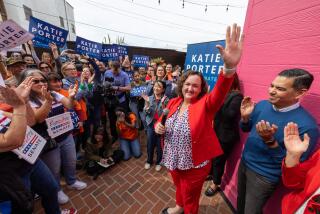A Candidate Worth a Second Look May Get Some Extra Votes
- Share via
A study measuring the role that looks play in elections reveals that Rep. Ed Zschau could win the race for the U.S. Senate by a hair, or several hundred hairs.
The nappy-headed Zschau has a 5% to 7% physical advantage over the bald Sen. Alan Cranston, according to UC Irvine professor Shawn Rosenberg, who conducted the study.
Zschau, however, still does not qualify as a political poster boy. “He is mediocre by the standards people look for in candidates,” Rosenberg said. “His looks are an advantage. But they are not as great as he thinks they are.”
Rosenberg’s views are based on an 18-month study in which nearly 30 people chosen at random picked the features they liked and didn’t like in 700 photographs of candidates from across the country, including Zschau and Cranston. Based on the findings of the survey, Rosenberg determined that appearance can account for 5% to 10% of the vote.
Rosenberg, 35, who teaches psychology and political science, said the findings are not encouraging for the political process. “It means people aren’t making the kinds of informed judgments necessary in a democracy,” he said.
Rosenberg said that Cranston’s image rating was poor because of his gaunt appearance. Zschau fared better, but still received some low marks for being too youthful looking, and for having dark eyebrows and small eyes.
Rosenberg, who said he is unaware of any other similar studies, found that 30 aspects of a politician’s appearance can affect the way he or she is perceived by voters. Male candidates with flat cheekbones, angular jaws and eyes rounded at the top received the highest marks for competence and trustworthiness.
Thin lips and formal attire were also seen as a plus. Candidates in suits fared better than those dressed casually. Study participants frowned on long hair and hair parted in the middle. “We found that the background of a photograph made no difference,” Rosenberg said.
Rosenberg’s study does not provide much encouragement for ugly politicians. But the professor said that physical factors are canceled out in races where the candidates are equally unattractive. He said looks also play a lesser role in cases where the candidates are split over specific issues.
When the issues are clouded or complex, however, look out. Rosenberg said: “Appearances make a difference. We found that the photographs project a very clear image of the candidate. . . . It is important to look competent and reliable.”
A big surprise in the study involved foreheads. Rosenberg said it was generally assumed in politics that candidates with large foreheads attracted voters because they look intelligent. But the people who participated in his study ignored the forehead factor.
Rosenberg is still working on his study of women in politics. His early findings, however, indicate that models are not likely to have a bright political future. The people who participated in Rosenberg’s study were turned off by “cosmopolitan good looks.”
More to Read
Get the L.A. Times Politics newsletter
Deeply reported insights into legislation, politics and policy from Sacramento, Washington and beyond. In your inbox twice per week.
You may occasionally receive promotional content from the Los Angeles Times.










